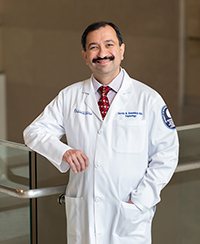About Division of Nephrology
- Department of Medicine
- About Department of Medicine
-
Specialties
- Cardiology
- Clinical Immunology
- Digestive Diseases
- Endocrinology
- General Internal Medicine
- Geriatrics
- Hematology and Oncology
- Hospital Medicine
- Infectious Diseases
- Nephrology
- Palliative and Supportive Care
- Pulmonary, Critical Care and Sleep Medicine
- Genetics and Genomics
-
Education Programs
- Student Programs
-
Internal Medicine Residency Program
- Internal Medicine Residency Program Home
- About the Program
- Residents
- Applicants
- Social Media
- Medicine/Pediatrics Residency Program
- Fellowship Programs
- Board Review Course
- Research
Director's Welcome
 Welcome to the website of the University of Mississippi Medical Center Division of Nephrology. I’m honored to lead a team dedicated to providing state-of-the art care for patients with a wide range of complex kidney diseases and comprehensive care to patients undergoing kidney transplants.
Welcome to the website of the University of Mississippi Medical Center Division of Nephrology. I’m honored to lead a team dedicated to providing state-of-the art care for patients with a wide range of complex kidney diseases and comprehensive care to patients undergoing kidney transplants.
We are committed to providing compassionate, pioneering and advanced care for the spectrum of kidney diseases.
Part of an academic medical center with the only Level 1 trauma and transplant centers in Mississippi, our kidney care is driven by a rich history of discovery, innovation, research and education. From an understanding of the principles of physiology contributing to kidney disease developed by Dr. Arthur C. Guyton, to paradigm-changing dialysis care pioneered by Dr. John D. Bower, our experienced kidney specialists treat patients with a unique patient-centered clinical perspective, using cutting-edge technologies and resources on-par with leading U.S. academic medical centers. Our nephrologists and advanced practice providers treat approximately 10,000 patients each year, including over 4,000 patients in our outpatient clinics.
And with the state’s only kidney transplant program, we deliver evidence-based care for patients receiving kidney transplants. We evaluate roughly 500 patients yearly for kidney transplant listing and manage approximately 1,300 kidney transplant recipients in our outpatient clinics. In addition, we have recently started performing kidney transplants in HIV positive recipients.
We improve the understanding of the nature and treatment of kidney disease through basic science and clinical research.
UMMC has always been on the forefront of dialysis treatment and research, beginning with Dr. Bower’s work in 1966. We continue his legacy with ongoing research funded by the National Institutes of Health and partners in industry. We also remain committed to finding new and better ways to prevent and treat kidney disorders, investigating underlying causes and mechanisms of kidney injury due to hypertension, diabetes, and autoimmune disorders. The Division is now offering non-radioactive glomerular filtration function (GFR) measurement, including for persons considering kidney donation.
We continue to build, expand, and integrate our research capacity and clinical operations focusing on population health strategies to ensure all our patients receive the best possible care. Leveraging the expertise of the UMMC Center for Telehealth, our new telehealth initiatives eliminate geography and distance as barriers to high-quality clinical care.
We train Mississippi’s nephrologists, clinicians, and researchers.
Our experienced faculty are dedicated to educating our medical students, residents, and nephrology fellows on the diagnosis, treatment, and management of kidney-related disorders. Nephrology training at UMMC is an intensive clinical experience that includes all facets of nephrology practice and prepares trainees to offer the best care to patients. And our faculty’s on-going research helps ensure trainees understand how research findings inform clinical care.
Kidney diseases take a major toll on the health of individuals, and Mississippi has one of the highest rates of kidney disease and its risk factors. I am grateful for the opportunity to lead a Division that takes such pride in delivering a patient-centric, team approach to the care, education, and research of kidney-related disorders.
I look forward to connecting with you. Please reach out to me or my staff should you have questions.
Neville Rohinton Dossabhoy, MD, FACP, FASN
Professor of Medicine, Physiology and Biophysics
John D. Bower Chair and Director
Division of Nephrology


